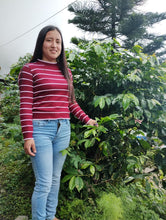Process: Washed We Taste: Black Cherry, Graham Cracker, Milk Chocolate, Sparkly Roast Level: Light
HISTORY
From a young age, Dolores was immersed in the world of coffee production, learning directly from her parents, both dedicated coffee growers. After her father's passing, Dolores continued his legacy, applying his teachings to run the family farm with integrity, resilience, and a commitment to excellence. For her, producing high-quality coffee goes far beyond just growing beans — it involves careful attention to every stage, from farming and harvest to meticulous post-harvest processes.
Dolores faces daily challenges, from labor shortages to fluctuating coffee prices and threats from diseases and pests. But she remains focused in her approach, embracing sustainable practices to protect the environment, including maintaining natural barriers and preserving local flora and fauna.
Her commitment to sustainability reflects a deep respect for her land and community,
whom she supports by sharing her knowledge and participating in local training sessions.
In her eyes, coffee isn’t just a crop; it’s a lifeline for the families in her community, providing a stable income and the opportunity for a better quality of life. Dolores’s excitement for her work grows with each season, especially as she embraces innovations aimed at improving crop health, building direct connections with customers, and staying updated on industry trends.
A true coffee lover, Dolores enjoys her coffee the traditional way — brewed in a pot with milk and sugar, savoring 4 or more cups a day. Off the farm, she finds joy in music, playing basketball, and spending time with her family and friends.
PROCESSING
Dolores has protocols and parameters in place to ensure that the coffee cherries being picked are at optimal maturity. Once the cherries are picked, they are floated in water to remove the lower-density cherries, and then they are hand sorted. The cherries are then de-pulped on her farm, fermented in tanks, and washed before they are finally dried on raised beds mostly in the shade. By slowly drying on raised beds, the coffee benefits from having continuous, delicate airflow. By mostly avoiding direct sunlight, the coffee is protected from being damaged by excessively hot temperatures. This dedicated approach guarantees a high-quality coffee that tells the story of its careful journey from farm to cup.




